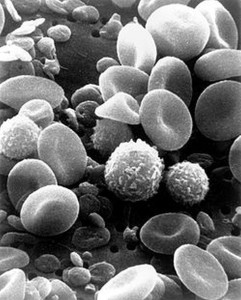“I wonder if this is borne out statistically in the public health realm,” said Infectious Diseases specialist Angela Merkel of Berlin University.
 Göttingen, June 19 – Scientists at the University of Göttingen have discovered that the cells responsible for fighting off infection in in the bodies of Europeans do not respond as aggressively to bacteria and viruses as do those of other populations, according to a new study.
Göttingen, June 19 – Scientists at the University of Göttingen have discovered that the cells responsible for fighting off infection in in the bodies of Europeans do not respond as aggressively to bacteria and viruses as do those of other populations, according to a new study.
Immunologists at the university tested the white blood cell responses in eight hundred European volunteers and and compared them with a control group of similar age and gender proportions from other parts of the world. As described in an article in next week’s issue of the the New England Journal of Medicine, the researchers discovered that the T-cells, which are the front line of defense against many types of infection, respond with less than a quarter of the assertiveness than comparable cells in other populations.
Lead author Immi Grant, a postdoctoral researcher at Göttingen, said the subject requires more study, but this experiment underscores the need to monitor European systems to ensure that unwelcome elements do not exploit the Continental population’s vulnerabilities and compromise its survival or health.
“We don’t know if it has always been the case, but at least the current state of European immunity is that it lags significantly behind that of other populations,” said Dr. Grant. “While we cannot go back in time to determine whether this marks a change, even a gradual one, in European pathology, at least going forward we have a way to keep track of how the European body handles the threat of invasion, and as such a way to help decide on what steps, if any are necessary to protect it.”
Immunologists not involved in the study expressed surprise at the findings. “I wonder if this is borne out statistically in the public health realm,” said Infectious Diseases specialist Angela Merkel of Berlin University. “It would be a pretty big deal and could well require massive changes to public policy, and such a move is not to be entertained lightly. I think we need to monitor things over the next fifty to one hundred years before we undertake such measures with confidence.”
Dr. Grant warned that waiting that long would spell disaster. “I understand needing to wait for further peer-reviewed studies to replicate our results, but the key in treatment is a quick response, especially to such potentially virulent invaders,” she argued. “If we keep waiting and not doing anything to bolster European immunity, it will be too late by the time any plan of action is implemented.”
Dr. Merkel said in response that European governments were simply not interested in funding further such experiments.




